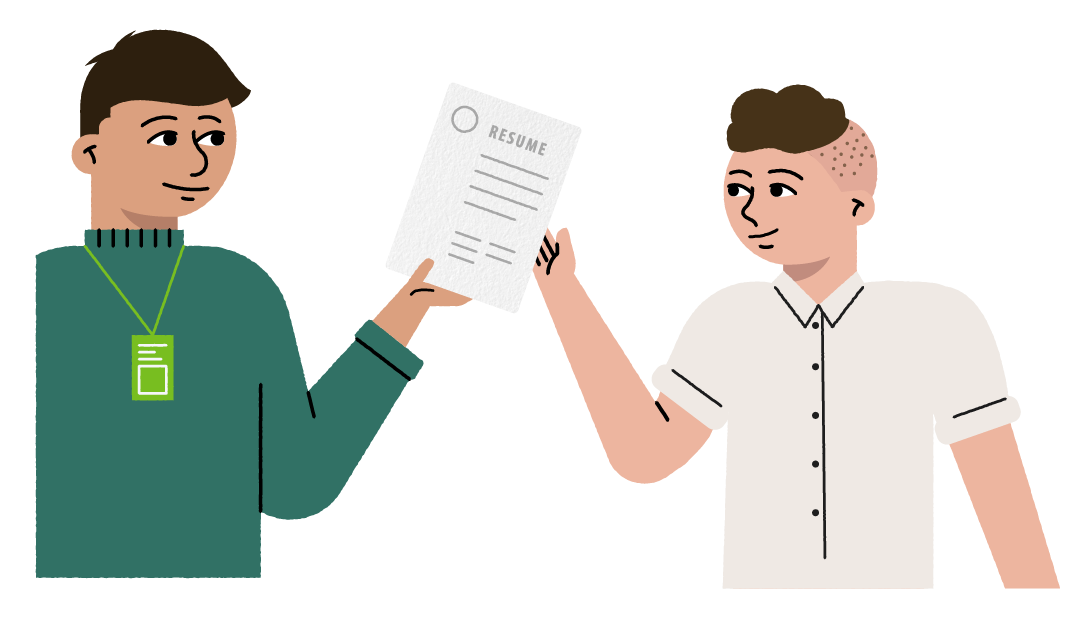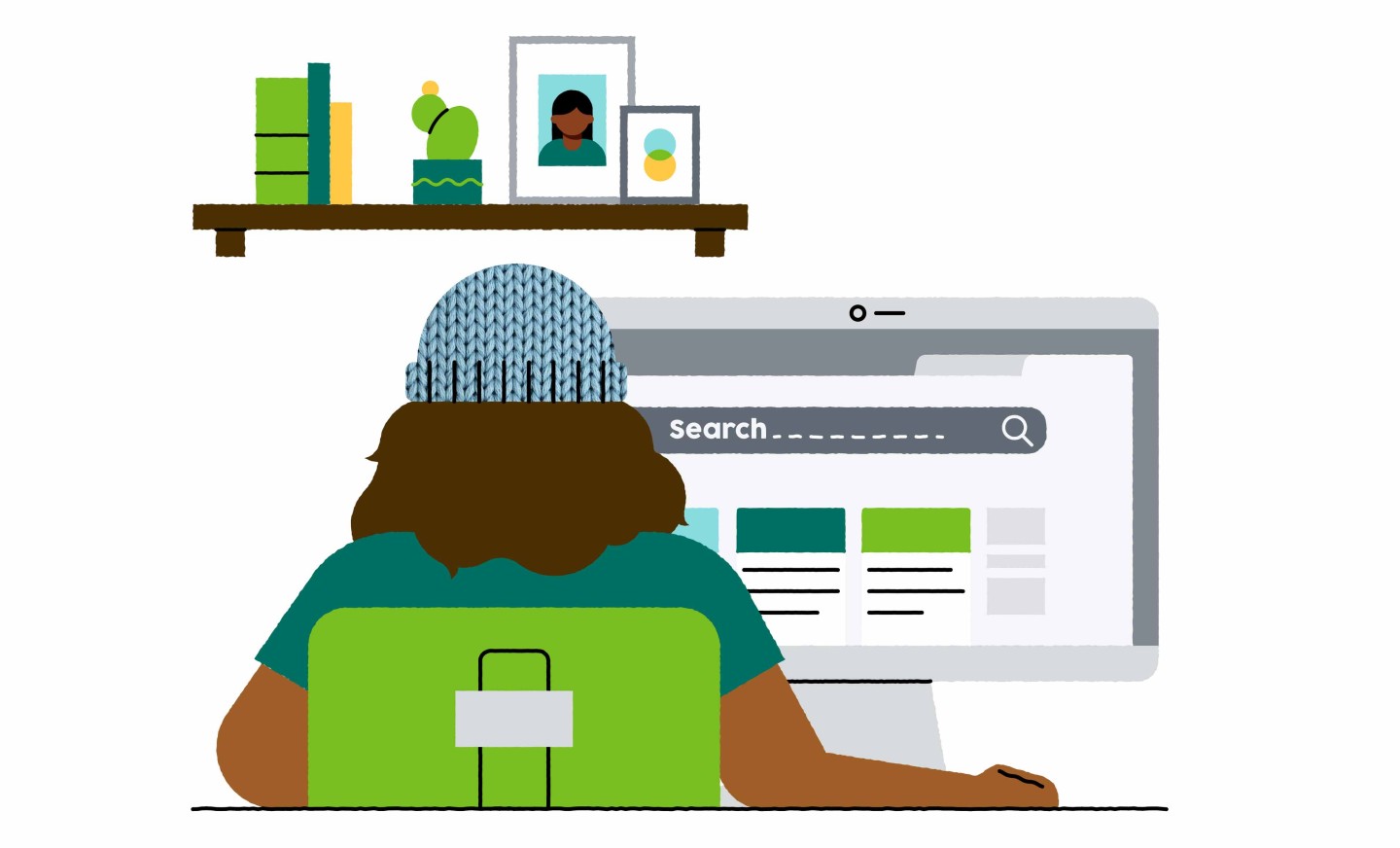This page will cover:
- What is a resume?
- What to include in your first job resume
- What to leave out of your resume for your first job
- How to format your resume for your first job
- How to order your resume
- Should I include references/referees on my resume?
- Tips for writing your first job resume with no job experience
- How to highlight your skills on your resume
- Examples of good first job resumes
- Where can you get support?
Your resume is an opportunity to showcase your skills, experiences, and potential. In this guide we will walk you through the process of writing a resume specifically tailored for you, from understanding what a resume is, to formatting, highlighting skills, and avoiding common mistakes. This guide will equip you with the essential knowledge to create a standout resume that captures the attention of employers.
What is a resume?
Before diving into the details, let's start with the basics. A resume (you might have heard this called a CV) is like your personal introduction to potential employers. It's a document that showcases your skills, experiences, and qualifications, providing a snapshot of who you are and what you can bring to a job.
What to include in your first job resume
When creating a resume, it's important to remember that employers often receive numerous applications, so your resume needs to stand out. It's your chance to make a strong first impression and grab their attention, which can increase your chances of being invited for an interview.
When writing your first resume, make sure that you:
Match experience to job listing
Review the job description and key requirements for the job you are applying for, then tailor your resume to match it. You could also include any key words that are listed in the job description in your resume where appropriate. Focus on the skills and experiences that are relevant and highlight your achievements and how they demonstrate your abilities. For example, if the job ad says something like ‘you will provide exceptional customer service and create authentic experiences in store’, try and use words like ‘exceptional customer service’ somewhere in your resume if appropriate.
Include education
Highlight your education, including the name of your school, any relevant coursework or subjects, school events or projects you participated in, and academic achievements. You certainly don’t have to include your education, but it can help to create a timeline for the employer so they can see how you have spent your time while looking for work.
If you have received any certificates or awards, be sure to mention them as they demonstrate your hard-work and commitment to your studies.
Highlight volunteer and extracurricular activities
Even without formal work experience, you may have participated in volunteer work or been actively involved in other school or personal interests. Highlighting these experiences on your resume gives you an opportunity to emphasise any skills you have gained from that experience, such as your initiative, dedication, and ability to work as part of a team. Whether it's volunteering at a local charity, participating in school or sporting clubs, or organising community events, these activities can showcase your skills and make you a well-rounded candidate.
Think outside of the box and consider other things you may do, such as babysitting, helping neighbours or family friends with chores around their house or helping out with the family business!
List technical and human skills
It is good to include at least 4-5 skills on your resume, with a mix of both technical and human skills.
Technical skills refer to specific abilities related to technology, software, or tools that are relevant to the job you're applying for. For example, if you're skilled in using graphic design software or have experience coding, be sure to include these skills.
Human skills, also known as soft skills, include qualities such as communication, teamwork, problem-solving, and adaptability. These skills are highly valued by employers, so it's important to emphasise them on your resume.
This is another opportunity to think outside of the box – think of things you've done or learned to do as part of your everyday life. For example, have you grown up with younger siblings? Perhaps you have gained some skills like leadership, conflict management, and time management. Participating in sports or other group activities can give you skills such as teamwork, communication and problem-solving.
Write a resume objective
An objective statement on a resume is like a little note at the top that tells the person reading your resume what job you want and what you're all about. It's like saying, "Hey, I'm looking for a job in this field, and here's what I'm good at." It helps the person hiring know what you're interested in and what you can bring to their team. If the job ad asks for a cover letter as part of your application, you may like to remove the objective statement from your resume and include that information in your cover letter instead.
Your objective should be a short statement that shows what you want to achieve in your career and what you can bring to the table. Remember to customise your objective for each job you apply for, using words from the job ad to show you're a great fit. By writing a catchy resume objective, you'll get the attention of employers and show them that you're ready to take on your first job with confidence and a can-do attitude.
What to leave out of your resume for your first job
While it's important to include relevant information on your resume, there are certain things you should leave out:
Avoid using overly casual language
Your resume should be written in a professional and formal tone. Avoid using slang or abbreviations. Keep the language concise, clear, and respectful.
Focus on relevant information
Avoid including irrelevant personal details, such as your favourite hobbies or unrelated experiences (you could talk about that kind of stuff in your interview!). You could include seemingly unrelated experiences to the job if they highlight the transferrable skills that are relevant and make you a strong fit for the specific position you’re applying for instead of excluding them altogether.
Be mindful of sharing too much personal information
You don’t need to include your full street address or date of birth on a resume. If the job you are applying for directly asks you to include your location, you could include your state and/or suburb.
A common question that a lot of young people ask is, ‘do I need to have a photo on my resume?’. People have different opinions on this matter, but we suggest not to use a photo. One of the biggest reasons not to use a photo is because many companies use Applicant Tracking Software (ATS) to sort through resumes from online job applications, and this software can have issues properly scanning resumes that have graphics or images.
How to format your resume for your first job
The formatting of your resume is vital to its overall appearance and readability. Here are some tips for formatting your first job resume
Layout
Keep it simple and organised. Use headings and bullet points to make it easy to read. Avoid the use of columns if possible, because ATS may not be able to pick up information in columns.
Pick a common font
Choose a clear and easy-to-read font like Arial or Calibri and avoid fancy or hard-to-read fonts. It can be tempting to jazz up your resume by using a fancy font or bright colours, but this could actually decrease the chances of an employer reading your document as it makes it harder to read.
Stick with an appropriate font size as well (size 11 or 12), and don’t try to unnecessarily fill up space by increasing the font size.
Use bullet points to describe your experiences
Instead of long paragraphs, use 3-4 bullet points to highlight relevant skills and achievements. These bullet points may describe a certain project you worked on or key tasks that you completed in that role. This approach not only makes your resume more engaging but also helps employers quickly identify relevant information.
Keep it short
Unless you have extensive work experience, keep your resume to one or two pages. Focus on the most important experiences and skills that relate to the job you're applying for. Keep it brief and avoid unnecessary details. If you’re finding that your resume only just pushes over to a second page, try re-formatting it to bring it back to one page.
How to order your resume
- Full name
- Contact information (such as phone number and email address) and make sure your email address is professional and appropriate. You might consider creating a new email address specifically for job applications.
- Objective statement
- Skills (including personal attributes, technical and human skills)
- Employment and/or volunteer experience in chronological order, from most recent to least recent.
- Education information
- References/referees (if requested)
Should I include references/referees on my resume?
If the job ad directly asks you to provide references on your resume, then yes – you should include them. It’s still a good idea to organise these referees before applying even if you don’t list them on your resume. That way if you progress to the final stage of your application, you’ve got that information ready to go. You can check out this article from Indeed for more information on references.
Tips for writing your first job resume with no job experience
If you don't have any formal job experience, don't worry. You can still create a great resume by following these tips:
Use action verbs when describing your skills and experiences
Start your bullet points with action verbs to describe your accomplishments. Words like achieved, solved, collaborated, organised or improved can make your skills stand out and show that you were actively involved in activities.
You could also look up synonyms for some words to avoid repeating the same verbs over and over.
Include the same words and terms from the job listing
Many companies use Applicant Tracking Software (ATS) to sort through resumes based on keywords. To increase your chances of getting noticed, incorporate keywords and phrases from the job listing into your resume. This shows employers that your skills and experiences align with their requirements.
Proofread
Check your resume for any spelling, formatting or grammar mistakes. Ask a trusted friend, family member, or teacher to review it as well. A well-proofread resume shows attention to detail and professionalism, which are highly valued by employers.
How to highlight your skills on your resume
Quantify your accomplishments
Whenever possible, use specific numbers or metrics to quantify your achievements. For example, instead of saying you ‘improved sales,’ say you ‘increased sales by 20%.’ Instead of saying you ‘improved grades’, say you ‘improved in the subject I find most challenging, mathematics, by sticking to a structured study schedule and increased my grade from a C in grade 11 to an A in grade 12.’
Highlight transferable skills
Include skills that are transferable to different jobs, such as communication, problem-solving, teamwork, or leadership. These skills are valuable in any work environment.
Examples of good first job resumes
Here are some templates that you can use to build your first resume. These templates are ATS friendly and include some examples under each heading to give you a head start.
Template 1: Resume template for first job - no work experience example (Word Document - 24kb)
Template 2: Resume template for first job - some employment or volunteer experience example (Word Document - 25kb)
Remember, your resume is your opportunity to make a positive impression on potential employers. By following these tips and guidelines, you can create a resume that showcases your strengths and increases your chances of landing your first job.
Get support
If you're aged 15 - 25 and want some advice on building your first resume, job searching, applying for work, and everything in between, get free and confidential support from headspace Work and Study and sign up for one-on-one support.
For support with your mental health and wellbeing, find your nearest headspace centre or access online and telephone support via eheadspace.
For more information, to find your nearest headspace centre or for online and telephone support, visit eheadspace
The headspace Content Reference Group oversee and approve clinical resources made available on this website.
Last reviewed 17 October 2023.
Herrity, J. (Updated 2023, July 8). 70+ Resume Objective Examples (With Tips and How-To Guide). Indeed. https://www.indeed.com/career-advice/resumes-cover-letters/resume-objective-examples
Indeed. (N.D). What Is ATS (Applicant Tracking Software)? https://www.indeed.com/hire/c/info/what-is-ats
Kennedy, J. L. (2011). Resumes for Dummies, 6th edition. Wiley Publishing, Inc. https://books.google.com.au/books?hl=en&lr=&id=G7JgqqQcf6cC&oi=fnd&pg=PT1&dq=writing+your+first+resume&ots=JPLmqK5vjm&sig=DhuGniaXbJlMlQRSE5UwZkVplb0&redir_esc=y#v=onepage&q=writing%20your%20first%20resume&f=false
SEEK. (N.D). How to get your resume past the robots. https://www.seek.com.au/career-advice/article/how-to-make-sure-a-human-reads-your-resume
SEEK. (N.D). Writing your resume. https://www.seek.com.au/career-advice/article/resume-cv
SEEK. (N.D). 7 signs your resume is just right. https://www.seek.com.au/career-advice/article/7-signs-your-resume-is-just-right
SEEK. (N.D). How to create a transferrable skills resume. https://www.seek.com.au/career-advice/article/how-to-create-a-transferable-skills-based-cv
SEEK. (N.D). 5 ways to talk to achievements in your resume. https://www.seek.com.au/career-advice/article/how-to-talk-about-achievements-in-your-resume
SEEK. (N.D). Transferrable skills checklist. https://www.seek.com.au/career-advice/article/transferable-skills-checklist
Youth Central. (N.D). How to write a resume. https://www.youthcentral.vic.gov.au/jobs-and-careers/applying-for-a-job/what-is-a-resume/how-to-write-a-resume
Youth Central. (N.D). How to stand out without work experience. https://www.youthcentral.vic.gov.au/jobs-and-careers/applying-for-a-job/how-to-stand-out-without-work-experience
Get professional support
If you feel you need help there are a range of ways we can support you.


